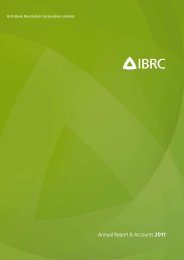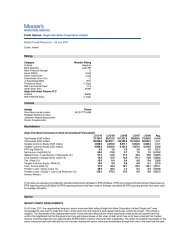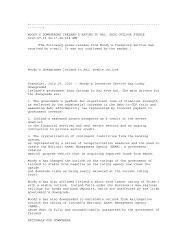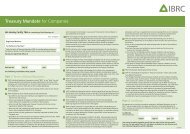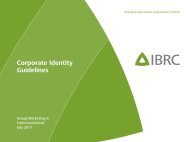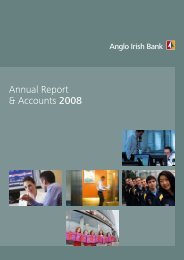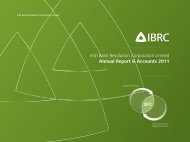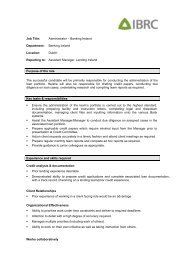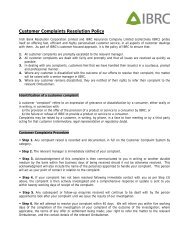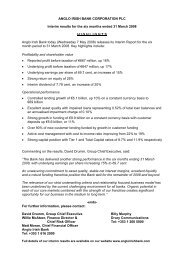Annual Report & Accounts 2009 - Anglo Irish Bank
Annual Report & Accounts 2009 - Anglo Irish Bank
Annual Report & Accounts 2009 - Anglo Irish Bank
You also want an ePaper? Increase the reach of your titles
YUMPU automatically turns print PDFs into web optimized ePapers that Google loves.
Notes to the financial statements continued<br />
1. General information and accounting policies continued<br />
1.2 Basis of preparation continued<br />
Following an assessment, the Directors have determined that it is reasonable to conclude that the <strong>Bank</strong> will continue in operational<br />
existence for the foreseeable future and therefore the financial statements have been prepared on a going concern basis. This<br />
assessment is underpinned by the Minister's consistent statements that the Government will ensure the continued viability of all systemic<br />
financial institutions, including the <strong>Bank</strong>, in a manner which is consistent with EU state aid rules. In making this assessment the Directors<br />
considered the potential impact that the following risk factors and uncertainties could have on the future performance and financial<br />
position of the <strong>Bank</strong>: the NAMA process (note 24), liquidity (note 51), credit quality (notes 27 and 51), regulatory capital (note 53), EU<br />
state aid considerations and political factors impacting both the Group and the industry. The timing of the NAMA asset transfers and the<br />
valuation discounts applied are important considerations. Liquidity risk considerations take into account the Group's ability to continue to<br />
access wholesale and money market lines, the ability to continue to access essential central bank and other special funding facilities,<br />
potential re-finance risks and the behaviour of the <strong>Bank</strong>’s retail and corporate depositors. Credit quality will largely follow trends in the<br />
main economic environments in which the Group operates, which are uncertain. In addition, decisions by regulatory authorities, the EU<br />
or the body politic could adversely impact on the <strong>Bank</strong>'s ability to continue as a going concern.<br />
Notwithstanding the existence of such uncertainties, the Directors in making the determination have taken into account the following<br />
mitigating factors: the capital injection of €4bn in <strong>2009</strong>, the Minister's letter of 22 December <strong>2009</strong> which restated his previous<br />
commitments in relation to ensuring that the <strong>Bank</strong> has sufficient capital to continue to meet its regulatory capital requirements, the<br />
subsequent receipt of a promissory note to the value of €8.3bn in fulfilment of the Minister's commitment, the forecast receipt of senior<br />
NAMA bonds in 2010 which will be liquidity enhancing, an improving outlook for both the UK and US commercial property markets, the<br />
continued support of the Government in relation to funding, and the introduction of measures by the Government to improve liquidity<br />
including the Government guarantee introduced in September 2008 and the Credit Institutions (Eligible Liabilities Guarantee) Scheme<br />
<strong>2009</strong> ('the ELG Scheme') introduced in December <strong>2009</strong>. In making the determination the Board has assumed the continuing availability<br />
of secured funding facilities with the Central <strong>Bank</strong> and other special funding facilities if required. As a result the Directors are satisfied<br />
that it is appropriate that the Group's financial statements continue to be prepared on a going concern basis.<br />
The reported results of the Group are sensitive to the accounting policies, assumptions and estimates that underlie the preparation of its<br />
financial statements. <strong>Irish</strong> company law and IFRS require the Directors, in preparing the Group's financial statements, to select suitable<br />
accounting policies, apply them consistently and make judgements and estimates that are reasonable and prudent. A description of the<br />
significant accounting estimates and judgements is set out in note 1.33 on pages 56 to 58.<br />
1.3 Adoption of new accounting standards<br />
From 1 October 2008 the Group has adopted the following amendments to standards and interpretations:<br />
� Amendment to IAS 1 - Presentation of Financial Statements;<br />
� IFRIC Interpretation 12 - Service Concession Arrangements;<br />
� IFRIC Interpretation 13 - Customer Loyalty Programmes;<br />
� IFRIC Interpretation 14 - IAS 19 - The Limit on a Defined Benefit Asset, Minimum Funding Requirements and their Interaction;<br />
� IFRIC Interpretation 16 - Hedges of a Net Investment in a Foreign Operation; and<br />
� IFRIC Interpretation 18 - Transfers of Assets from Customers.<br />
Other than the application of the amendment to IAS 1 which the <strong>Bank</strong> has early adopted, the adoption of the above has had no impact<br />
on the financial statements. The amendment to IAS 1 has resulted in certain changes in the names and presentation of the financial<br />
statements.<br />
Recent amendments to IAS 39 Financial Instruments: Recognition and Measurement and IFRS 7 Financial Instruments: Disclosures permit<br />
the reclassification of certain financial instruments from held for trading and available-for-sale financial assets. The Group has not made<br />
any such reclassifications.<br />
Details of those standards, amendments to standards and interpretations that have been issued by the International Accounting<br />
Standards Board but which are not yet applicable to the Group are set out in note 1.34 on page 58.<br />
1.4 Basis of consolidation<br />
The consolidated financial statements include the financial statements of <strong>Anglo</strong> <strong>Irish</strong> <strong>Bank</strong> Corporation Limited and all of its subsidiary<br />
undertakings (including special purpose entities) prepared to the end of the financial period. An entity is a subsidiary where the Group<br />
has the power, directly or indirectly, to control the financial and operating policies of the entity so as to obtain benefits from its activities.<br />
The existence and effect of potential voting rights that are currently exercisable or convertible are considered in assessing whether the<br />
Group controls the entity.<br />
Subsidiaries are consolidated from the date on which control is transferred to the Group until the date that control ceases. The purchase<br />
method of accounting is used by the Group to account for the acquisition of subsidiary undertakings. Intercompany balances and any<br />
unrealised gains and losses, or income and expenses, arising on transactions between Group entities are eliminated on consolidation.<br />
Non-controlling interests represent the portion of profit or loss and net assets not owned, directly or indirectly, by the <strong>Bank</strong> and are<br />
presented in the consolidated income statement and statement of financial position separately to amounts attributable to owners of the<br />
parent.<br />
The accounting policies have been consistently applied by Group entities.<br />
46



